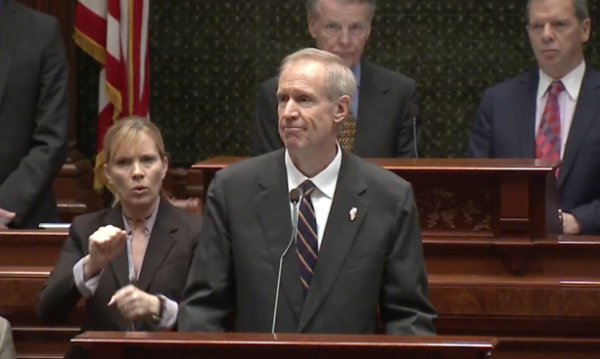As Rauner Touts Accomplishments, Dems Hear ‘Alternative Facts’

Gov. Bruce Rauner at the 2017 State of the State address to the Illinois General Assembly at the Statehouse in Springfield. Illinois Information Service
Gov. Bruce Rauner struck an upbeat tone in his third State of the State address Wednesday in Springfield.
He also tried to project an image of someone willing to compromise — but in such a way that Democrats say he glossed over his own role in the crisis that’s hobbling Illinois government.
The most important phrase in politics this week comes not from Illinois but Washington, D.C. It happened Sunday on the NBC News program “Meet the Press,” when Donald Trump advisor Kellyanne Conway was asked why the President's press secretary lied to reporters in his first full day on the job.
“You’re saying it’s a falsehood”, said Conway to “Meet the Press” moderator Chuck Todd, “and they’re giving — Sean Spicer, our press secretary — gave alternative facts to that. But the point really is ...”
“Wait a minute”, said a surprised Todd. “‘Alternative facts’? ...”
Yes, “alternative facts,” also known as “things that are not true,” or more colloquially, “lies."
It’s on this political landscape that Gov. Rauner fulfilled his constitutional obligation to report on the state of the state.
"Two years ago, when our Administration came into office, we set about to return Illinois to a state of growth and opportunity”, said Rauner, early in his State of State address.
To meet that objective, Rauner described three goals: make Illinois the "most ethical and efficient state,” “invest in education,” and — most importantly, he says — make Illinois more attractive to businesses — which politicians suggestively refer to as "job creators."
"Working together, we’ve begun to accomplish these goals, but much remains to be done”, Rauner told the General Assembly.
Among his accomplishments, Rauner listed improved cybersecurity, digitization of records, and blocking Executive Department employees from quitting to immediately become lobbyists of the administration.
Rauner also bragged about increasing state funding for schools — one of the only areas of government that he and the Democratic majorities in the legislature agreed to fully fund. And later, he turned to higher education.
"Illinois is home to some of the greatest research universities in the world”, said Rauner. “Working in partnership, we have the potential — and I’m personally 100 percent committed to this — we have the potential to create a technology and innovation center here in Illinois ... that can rival Silicon Valley."
For some Democrats, like State Rep. Elaine Nektritz of Northbrrok, this moment, right here, was the bridge too far.
“One of the things that struck me most about the speech was the call for creating like ‘world class higher education institutions,’ from a governor that wanted to cut higher education funding by sixty percent”, said Nektritz. “The irony of that fell, frankly, really hard on my ears.”
To be fair, Nekritz is misremembering the amount of Rauner’s proposed cut to state universities — it was just over 30 percent.
“Still. You know, when you talked about ‘alternative facts’ — that was sort of my alternative reality moment”, said Nekritz.
This became something of a theme among Democrats. Rauner waited until 25 minutes into his 35 minute speech to bring attention to the fiscal plague he and legislators have incubated in Illinois government. Many Democrats say that should have been up top.
"All I really want to hear is this: here is my balanced budget proposal”, said newly elected state comptroller Susana Mendoza.
Mendoza is a Democrat. State law gives Rauner until mid-February to come up with a spending plan. Then again, Illinois has been without a real budget for going on 19 months.
“The only thing that matters right now is the budget”, said Mendoza. “To expect any kind of rhetoric other than: ‘Here’s what I’m going to do, here’s my budget proposal and now I want everybody to take action on that,’ it’s really just a bunch of empty words that don’t mean anything to the people of the state of Illinois."
How much weight the people of Illinois give Rauner’s words and accomplishments likely depends on one thing: Whether the governor can help the state out of the financial hole that he helped to dig.
Regardless, his speech shows he's committed to campaigning for re-election in 2018 — with or without a state budget to run on.
Links
- Optimistic Tone, Praise For Senate Budget Efforts In Governor’s State Of The State Address
- Gov. Rauner To Take Optimistic Tone In State Of The State Address
- Rauner Seeks ‘Mutual Respect’ In State Of The State, But Skips Budget Hardships
- Gov. Bruce Rauner’s 2016 State of the State Address: Analysis And Reaction
- Governor Bruce Rauner Delivers Broad Agenda In State Of The State Address
- Governor Bruce Rauner Prepares For First State Of The State Address
- Rauner To Seek Common Ground In State Of The State Address

